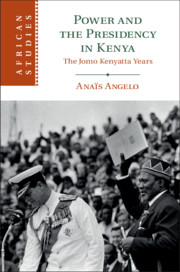Book contents
- Power and the Presidency in Kenya
- African Studies Series
- Power and the Presidency in Kenya
- Copyright page
- Dedication
- Contents
- Acknowledgments
- Introduction
- 1 Kenyatta’s Stateless Political Imagination
- 2 From Prison to Party Leader, an Ambiguous Ascension (1958–1961)
- 3 Kenyatta, Land, and Decolonization (1961–1963)
- 4 Independence and the Making of a President (1963–1964)
- 5 Kenyatta, Meru Politics, and the Last Mau Mau (1961/3–1965)
- 6 Taming Oppositions: Kenyatta’s “Secluded” Politics (1964–1966)
- 7 Ruling over a Divided Political Family (1965–1969)
- 8 “Kenyatta Simply Will Not Contemplate His Own Death” (1970–1978)
- Conclusion
- Sources
- Bibliography
- Index
- African Studies Series
4 - Independence and the Making of a President (1963–1964)
Published online by Cambridge University Press: 11 October 2019
- Power and the Presidency in Kenya
- African Studies Series
- Power and the Presidency in Kenya
- Copyright page
- Dedication
- Contents
- Acknowledgments
- Introduction
- 1 Kenyatta’s Stateless Political Imagination
- 2 From Prison to Party Leader, an Ambiguous Ascension (1958–1961)
- 3 Kenyatta, Land, and Decolonization (1961–1963)
- 4 Independence and the Making of a President (1963–1964)
- 5 Kenyatta, Meru Politics, and the Last Mau Mau (1961/3–1965)
- 6 Taming Oppositions: Kenyatta’s “Secluded” Politics (1964–1966)
- 7 Ruling over a Divided Political Family (1965–1969)
- 8 “Kenyatta Simply Will Not Contemplate His Own Death” (1970–1978)
- Conclusion
- Sources
- Bibliography
- Index
- African Studies Series
Summary
Chapter 4 explores how Kenya became, in 1964, a presidential republic. As the previous chapter showed, the centralisation of state resources (i.e. land) was decided before independence had been negotiated. Kenyatta thus found himself in control of centralized resources that enabled him to defend presidentialism (i.e. the concentration of extensive executive powers in the hands of the president) as the only possible system of rule for the post-colony. The chapter reconstructs the negotiations of presidential power: these were hasty and poorly anticipated by the divided Kenyan elite. The chapter argues that presidential rule emerged out of the weaknesses of KADU and KANU contenders, who depended on the central state to access state resources. The creation of an independent presidential republic in 1964 left Kenyatta not only with a new, but also an extensive set of powers to control a territory that was politically, socially and ethnically divided.
- Type
- Chapter
- Information
- Power and the Presidency in KenyaThe Jomo Kenyatta Years, pp. 115 - 140Publisher: Cambridge University PressPrint publication year: 2019

